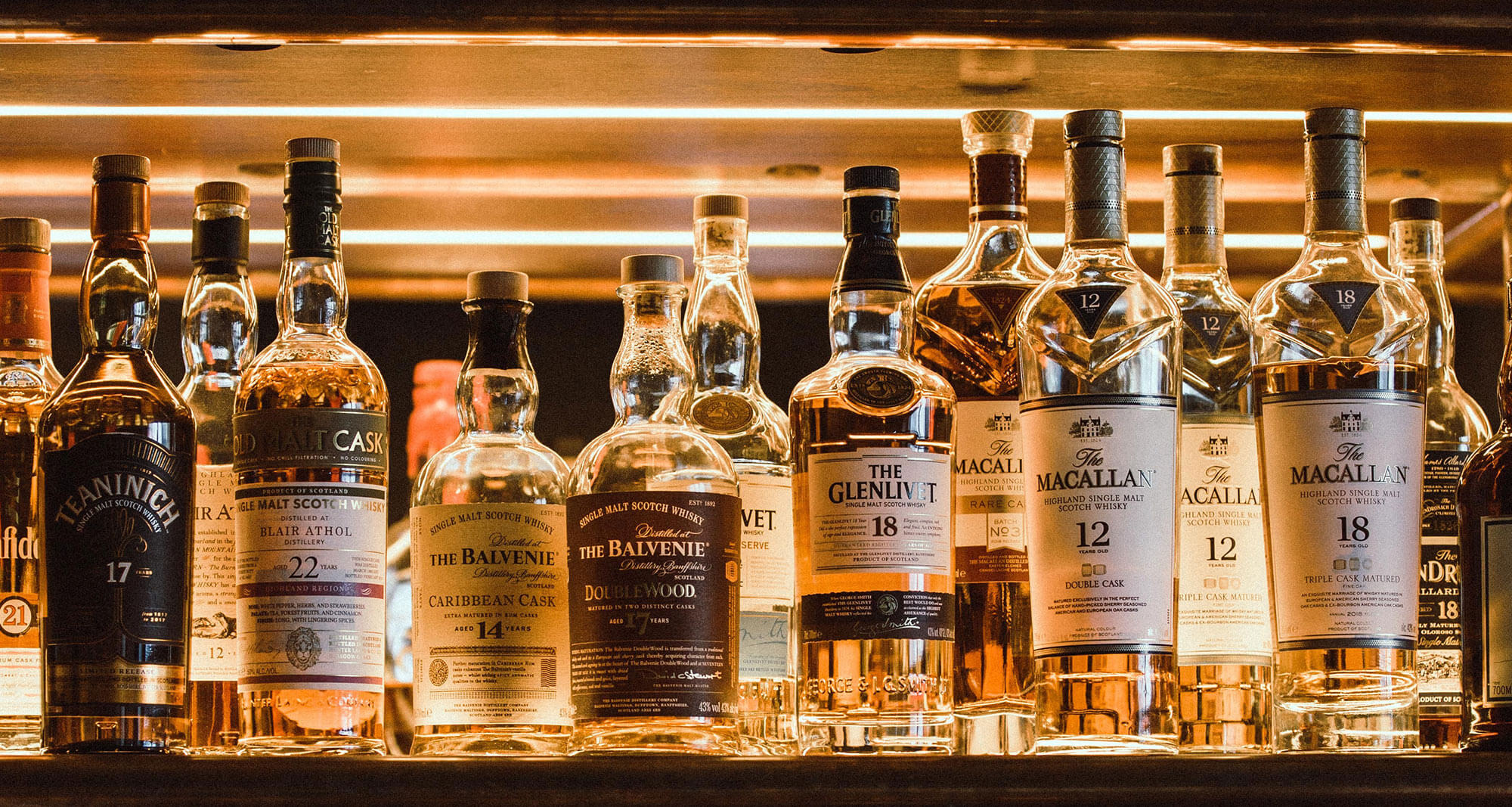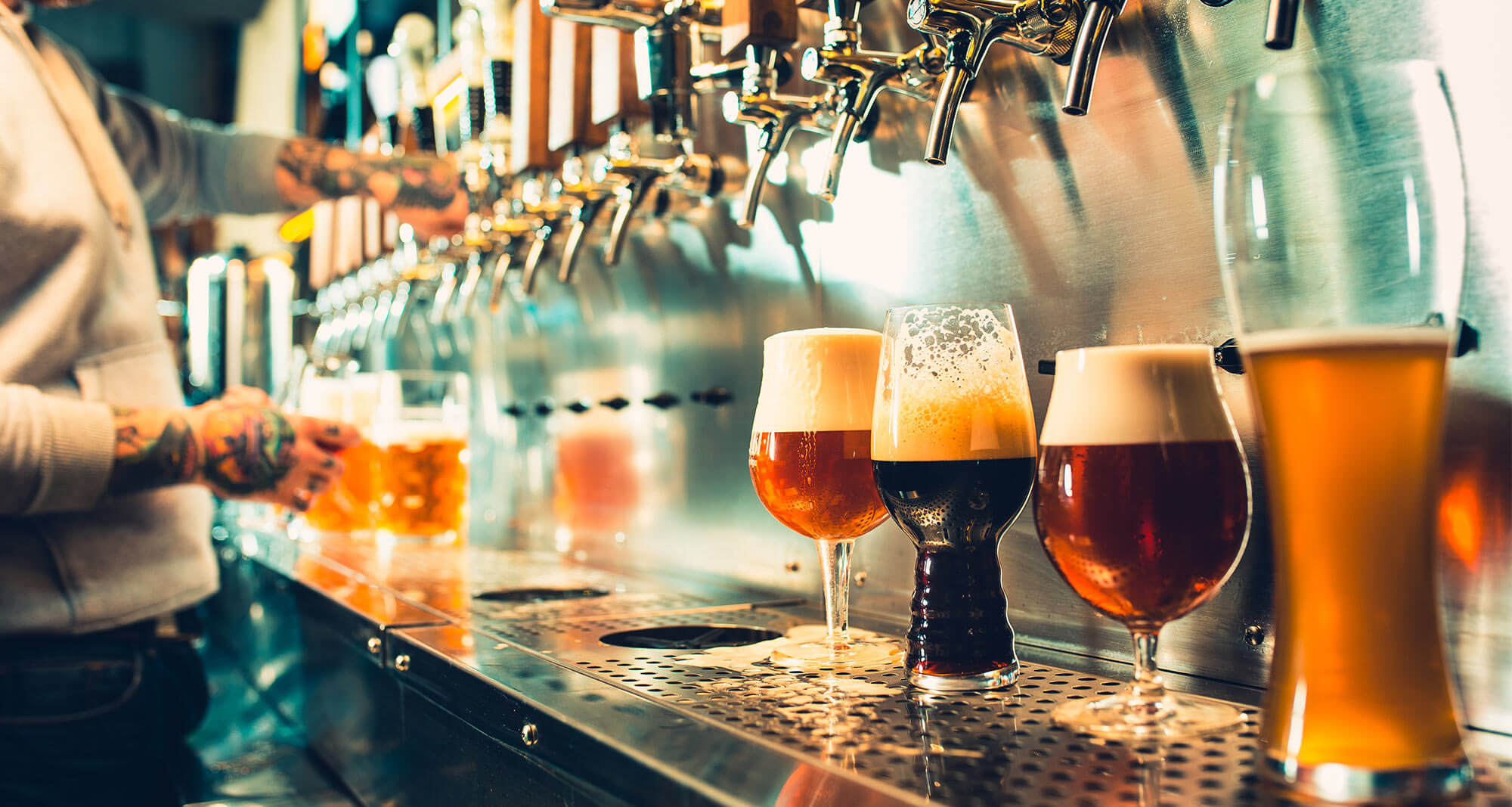It's an exciting thought, the idea of setting up a home bar but where do you start with it all? There's a lot of contrasting information out there about what should be stocked in your home bar. The food and drink options are almost endless, it seems. But what actually are the home bar essentials?
*enter our full bar liquor list*
As a bartending company, we believe we're well placed to provide you with some expert information. All you need to do is follow our comprehensive guide and your home bar will be up and running in no time!
Liquors for a home bar

Spirits are an essential part of the bar and bartending alike. A bar not adequately stocked with spirits is a disaster waiting to happen. If you want to put on a show for your guests and offer a great array of options, it's good to take the liquors seriously. Here are the 6 best liquors for a home bar...
1. Vodka
Many may see vodka drinkers as those with unrefined palates, but this would be doing the spirit (and drinkers) a disservice. Vodka has a lot to offer, so stocking a good range of vodka brands and styles can really enhance a home bar. Vodka is one of the most common liquors used in mixed drinks, so it's important to go for quality and not that de-icer stuff!
Top vodka brands: Ciroc, Grey Goose, Absolut, Smirnoff, Stolichnaya
2. Gin
Gin has become one of the most popular liquors in the world in recent years, with an increasingly brand-loyal following. This means getting your gin right is important.
Gin comes in many different styles like London Dry, Plymouth and New Western, just to name a few. Try to ensure you cover yourself by stocking these main types of gin, as they’re a hit with both customers and cocktails. Look into types of flavoured gin too. Floral, fruity, botanical and pink gin go down very well with the gin-lovers, so keep on top of industry trends to find out what's hot and what's not!
Top gin brands: Hendrick's, Tanqueray, Sipsmith
3. Rum
Compared to some liquors on this list, rum is a relatively simple category of bar liquors. Adhering to the bartending basics means stocking both a light and dark rum. Cover both of these styles of rum and you shouldn't encounter any rum-related problems. You could take your home bar stock selection to another level by adding in a spiced variety of the spirit. This will please any lovers of a fiery-tasting spirit, whilst taking cocktail recipes to new heights!
Top rum brands: Bacardi, Sailor Jerry, Havana Club, Kraken, Appleton
4. Tequila
Tequila comes in all shapes and sizes, so knowing the types of tequila is helpful for any new home bar owner. A blanco tequila is an absolute home bar necessity and is the most often used style of tequila. If you decided to just go with a blanco, this won't be the end of the world for your bar. There are other types like reposado and añejo, but unless you're in Mexico, it's unlikely guests will ask for these unique styles. Plus, most cocktails with tequila just take blanco, so it's a safe choice.
Top tequila brands: Patron, José Cuervo, Sauza, Olmeca, Sierra, Herradura
5. Whiskey
Whiskey (or whisky to some) is a big category with a huge array of options to explore. If you don’t know what is whiskey, then it’s worth researching this in detail before stocking your home bar. The main contenders for this liquor are Scotch whisky and American whiskey.
American whiskey can take on many different styles just in itself. Bourbon, Tennessee and Rye whiskey are the most common styles from the States. Lovers of the American stuff are usually very brand-loyal, so exploring common brands and styles is important. The most common American whiskey brands are Maker's Mark, Jim Beam and Jack Daniel's.
Scotch whisky, on the other hand, requires a bit more thought. There are so many types and flavour profiles of Scotch to choose from. Smoky, earthy, woody, sweet and peated whisky are just some of the amazing flavours that Scotch holds. Whisky cocktails like the Godfather and Rob Roy require a good Scotch in their recipes, so having at least one type is a must. What's great about Scotch is the variation of flavours. If you love to experiment and love letting your inner mixologist take control, look carefully into this type of whisky for inspiration. Popular brands include Glenfiddich, Balvenie, Tallisker, Grants, Laphroaig and Monkey Shoulder.
Some other notable mentions go to Canadian, Japanese and Irish whiskey. Whilst the American and Scottish varieties dominate the whiskey industry, these other three don't go down without a fight. Having that extra type of whiskey can just elevate the options of the home bar. If you want a recommendation, the Irish whiskey Tullamore Dew is an excellent choice here.
6. Brandy
Brandy is not considered to be the most important liquor in bartending, however given its presence in some classics, it's well worth stocking. Now, when looking for good quality, you'll need to empty your pockets a little. High quality brandies (basically Cognacs) require some expenditure. But, don't worry because they're likely to last a while due to the frequency and amount used within brandy-based cocktails. As a result, you'll probably only need to buy one of these home bar must haves, saving you some money.
Top brandy brands: Hennessy (Cognac), Remy Martin (Cognac), Courvoisier (Cognac)
Understanding the types of liquor
Within the bartending industry, there are three ways to describe the type of liquor stocked: well, call and top shelf. These effectively indicate the quality of the liquors on offer and can help you form your home bar's style.
Well liquors - These are the standard liquors stocked behind the bar. If a customer asks for a Vodka Cranberry without specifying the brand of vodka, they will be served a well liquor.
Call liquors - These liquors are branded but not necessarily of high quality or price. It's just of personal preference that the customer may want a specific brand.
Top shelf liquors - This is your top shelf alcohol, usually of very high quality and a price tag to match. These are the 'best liquors' around and are usually only taken neat.
Liqueurs for a home bar

No full home bar liquor list would be complete without the mention of liqueurs. We'll go through the 7 basics for a home bar, as well as some added extras!
1. Amaretto - An almond-flavored liqueur that's probably the most popular liqueur out there. It's regularly enjoyed neat but adds important sweet, nutty undertones to popular classic cocktails like the Godfather and Amaretto Sour. Absolute must have!
2. Orange liqueur - When talking about orange liqueur we mean the big hitters like Triple Sec, Cointreau and Curaçao. So many cocktails require a punchy hit of orange alcohol, so it's naturally become a bar staple. You probably only need one of these types of orange liqueur. It's all down to personal preference.
3. Coffee liqueur - The perfect addition to a milky cocktail, the coffee liqueur fits right at home in bars across the world. There are many different brands of coffee liqueur out there, like Tia Maria and Kahlua. However, some cocktail recipes call for brand-specific alcohol. Do your research before stocking a coffee liqueur, to make sure you can fulfil an order correctly!
4. Vermouth - Technically this is a fortified wine, but let's roll with it. What does a Vodka Martini, Negroni and Manhattan all have in common? They all use vermouth (and they're great cocktails too). When stocking your home bar you'll need both a sweet vermouth and dry vermouth. Don't even question it, just buy both styles.
5. Irish cream liqueur - If you're willing to roll out the home bar after hours, your guests might be requesting an alcoholic coffee of some kind. For this you'll need some Irish cream liqueur. Bailey's is the most popular brand and it comes in a variety of niche flavours too.
6. Italian liqueurs - When talking about Italian liqueurs here, we mean the universally-adored Campari and Aperol. Have you ever been to a bar that doesn't offer a Campari or Aperol Spritz? So, why shouldn't your home bar? It's a pure winner with most guests, especially on a hot summer's day. However, most importantly, Campari is key to a Negroni and Boulevardier.
7. Peach liqueur - If you want to make a Woo Woo, Sex On The Beach or Bellini, then you'll need some peach liqueur. The best brand for this liqueur is De Kuyper, in our opinion. Many wouldn't suggest peach liqueur is a home bar requirement, but we think it's in just enough classic cocktail recipes to be a consideration.
Other liqueurs
As we said, we want to give you a few extra liqueurs to stock. It's completely up to you which ones you want to stock, if any at all. This decision should be largely based on which mixed drinks you'd like to offer. We've ordered these in importance/common usage behind the bar.
Maraschino - This is a type of cherry liqueur used in many cocktails, like the Last Word. It provides a nice contradicting sweet-tart flavour to recipes.
Drambuie - A whisky-based liqueur hailing from Scotland.
Chambord - Perhaps the best bottle design on this list, Chambord is a raspberry liqueur with an intense red colour.
Crème de cassis - Key ingredients to a Kir Royal and El Diablo, this liqueur is flavoured with blackcurrants.
Coconut liqueur - If you want to offer a Piña Colada or other tropical cocktail creations, a bottle of coconut liqueur is essential. Malibu is the most commonly used brand.
Crème de mure - A blackberry liqueur with a deep purple colour.
Passionfruit liqueur - Serve up a bar favourite in the Pornstar Martini with this extra-fruity liqueur. De Kuyper make an excellent passionfruit liqueur.
Midori - The most famous green liqueur around. Made in Japan, Midori is a type of melon liqueur. It resembles the taste of a honeydew melon, rather than any other types of melon.
Crème de menthe - Staying with the green theme for a moment, this mint-flavoured liqueur offers subtle creamy mint notes to any mixed drinks needing a green touch.
Benedictine D.O.M - This is a type of herbal liqueur, similar to that of Jägermeister. However, its subtle flavours make it much more appropriate for use in mixed drinks.
Different types of liqueurs
When it comes to liqueurs, there are five different categories: bitter, herbal, fruit, nutty and emulsion liqueurs. Every liqueur mentioned above can be placed into one of these five types. With so many to choose from, bartenders have a huge amount flexibility in their ability to bartend. However, as long as your home bar is covered on the seven basic liqueurs, you'll be well prepared to make a good range of cocktails!
Non-alcoholic mixers

We didn't want to leave you in the dark about the other elements a home bar will need. We're talking about the non-alcoholic things. No home bar liquor inventory list would be complete without talking a little about the mixers at least. Here are the top mixers for your bar...
Orange juice - Orange juice is one of the most used mixers behind a bar. Excluding cocktail recipes, punters love to be mixing orange with any number of spirits and liqueurs. A home bar without orange juice? Very strange!
Pineapple juice - People love a good pineapple-flavoured drink. Marry it with another juice, like orange, and you're onto a winning cocktail.
Cranberry juice - Everyone always forgets about cranberry juice at the bar, until they remember and absolutely love it! Whether it's a Sea Breeze, Cosmopolitan or a plain old Vodka Cranberry, you'll need bit of this refreshing stuff in your fridge.
Tomato juice - Only really used in Bloody Mary's but still nice to have in the home bar incase the request comes in. Always be prepared!
Grapefruit juice - Always the bridesmaid, never the bride is grapefruit juice, but this doesn't reduce its importance. Used to give some citrus edge to a cocktail, grapefruit juice is not only great for bartending but also mixology, if you're into that.
Tonic water - If you can't offer guests a simple Gin and Tonic, what's the point? We'll include club soda water in this as well. A few bottles of both will suffice.
Ginger ale - Both ginger ale and ginger beer need to be stocked. They both have slightly different flavours, so that's why you'll need both. It's a bartending sin to use ale in a Moscow Mule and beer in an El Diablo!
Coca-Cola - Forget the alcohol drinkers and think of the alcohol-free people of the world for a second. An ice-cold glass of 'Coke' is arguably just as good as a cocktail. Plus, loads of different alcoholic drinks need it!
Sprite - Coca-Cola's opposite number, Sprite, is required for exactly the same reasons. Sometimes a cocktail needs a lighter fizzy touch and this is where Sprite comes in...
Other essential non-alcoholic ingredients
Grenadine - How on Earth do you ever expect to complete the famous Tequila Sunrise without this bar classic? Grenadine is a syrup made of pomegranates and is very easy to find in supermarkets. No excuses here!
Lemon juice - The list is endless of cocktails using a bit of lemon juice. Make sure to use fresh lemon juice, however, and not that store-bought stuff!
Lime juice - Just like with the lemon juice, lime juice is also widely used. Once again, buy fresh or don't buy at all.
Lime cordial - Sometimes your guests will want something a bit more simple. A Vodka Lime or Gimlet will be what they're looking for and are some of the easiest cocktails for beginners to make. If you're just starting out, lime cordial will be yours' and your guests' best friend!
Bitters - The wonderful world of bitters come in all shapes and sizes. Angostura, Peychaud's and orange bitters are widely used in bartending, but the Angostura bitters go unrivaled in use. Being able to dash a few bitters to finish a drink is what bartending's all about.
Sugar syrup - Also called a 'simple syrup', this non-alcoholic ingredient is one you can make yourself. All you'll need is some sugar, water and a bit of patience!
Garnishes

Following on from the non-alcoholic mixers, we thought we'd give a very quick run-down on some of the common garnishes you'll need alongside the full bar liquor list. No cocktail would be complete without a garnish of course...
Fresh herbs - Most commonly it's mint but basil and rosemary are also used within bartending, if not more so in mixology.
Citrus fruits - Lemon wheels, lime wedges, grapefruit slices and an orange twist. Citrus fruits provides a wide array of garnish potential, so stock them up!
Berries - Berries are used less than citrus fruits but having some strawberries to hand doesn't hurt! Whilst a Maraschino cherry is more sweet than fruit, it's part of the 'garnish basics' for a home bar.
Olives - Hosting a Martini night? You need some olives! Just make sure they're anchovy-free otherwise your guests will get a greasy, fishy Martini. On the theme of Martinis, some may appreciate cocktail onions, which are great because they can be left for a while without needing to be replaced.
Seasonings - It's always fun to do a salty rim (or even a sugary rim), so make sure you've got plenty of salt and sugar to offer these services. Also, a bit of black pepper to crack over a drink never goes a miss. But always remember to never over-do it. Your guests won't appreciate a glass of sea water with some floating pepper corns.
Beers, wines and ciders

Failing to prepare is preparing to fail, as the old saying goes. Not everyone loves a cocktail or spirit-based drink, so having backups means no guest goes unsatisfied!
Having bottled and canned beers available for those who prefer a hoppy taste, means the simple dink lovers don't go thirsty. Plus, having at least one cider will double these chances of keeping the pub-lovers on your side. It goes without mentioning that these can also be used as a cocktail ingredient, like a Michelada!
But it doesn't stop at beer and cider. A well-stocked bar also accounts for the wine drinkers. Whether that be regular or sparkling wine, a bartender's responsibility hinges on being able to accommodate a wide-range of drinking preferences. Likewise, wines make up a key part of some of the classic cocktails! An Aperol Spritz, Kir Royal, Mimosa, French 75 and Bellini all need a drop of the sparkling wine, so never forget it!
Final thoughts
This may seem like an exhaustive list of bar basics but in reality, it's what's needed to be prepared. By stocking all the essentials you'll put yourself in good stead to make a huge range of cocktails, satisfying party guests. Once the hard part is done of sourcing these ingredients, the fun can commence and your creative ability will thrive!
Want start bartending behind the bar professionally and learn over 50 classic cocktails? Read more about our bartender course to start your journey today!
